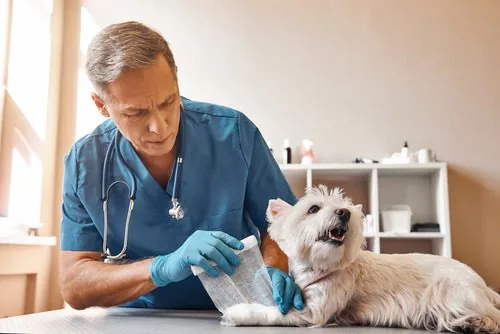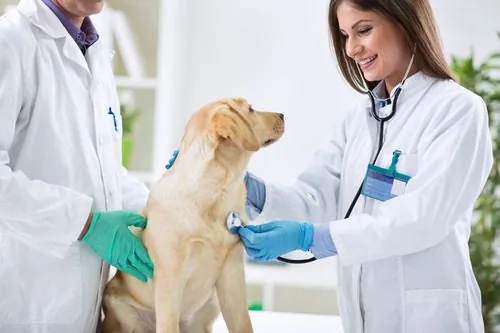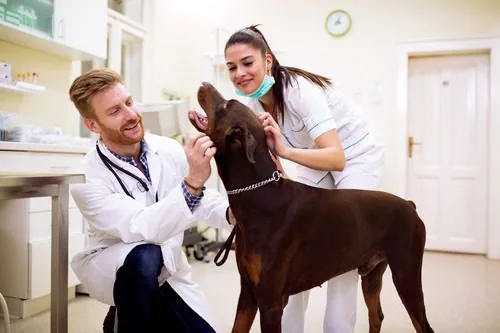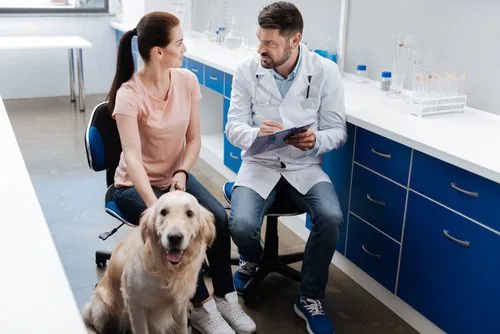Pyometra in Dogs: Symptoms and What to Do
Pyometra in dogs is a severe condition, and it can be fatal if it is not treated in time. If you have a female dog, you may consider having her spayed if she demonstrates any of the illness symptoms.
Dogs with pyometra typically have a white, yellowish, or green discharge from the vagina. They may also be drinking excessively and urinating frequently. If you see any of these indicators, bring your pup to the vet immediately.
There are also two types of pyometra, and these include open or closed pyometra. If you need to know the symptoms of pyometra in dogs and what to do, this article can help.

What is Pyometra?
Pyometra occurs in female dogs that have not been spayed. If it is caught early enough, there is a good chance of recovery. However, if it is not caught in time, it could lead to a fatal outcome. It occurs because of hormone changes in the dog’s body that trigger pus in the uterus. After your pup goes through her heat cycle, progesterone stays elevated for about two months, making the lining of the uterus thicken and prepare for pregnancy.
Pyometra is an infection in the uterus of a female dog. During the dog’s heat cycle, the uterus undergoes hormonal changes, and the lining becomes thick. During this cycle, the cervix is relaxed, and bacteria can enter and proliferate, causing infection and possibly death.
The bacteria that come into the uterus and the fluids that have built up are not eliminated. During the heat cycle, white blood cells defend her body from infection by increasing and attacking the bacteria. When your pup’s uterus is secured, the sperm can safely move into the female’s sex organs without being attacked by these white blood cells.
All this combined is the perfect storm to create a life-threatening infection. If the cervix is relaxed, bacteria typically in the dog’s vagina come through to the uterus. If the uterine is thick, its condition makes it ripe for bacterial growth.
If several heat cycles pass and pregnancy does not occur, the lining of the uterus continues to thicken, and cysts develop within the uterine tissues. The lining secretes fluid, which promotes the growth of bacteria. The uterine muscles do not contract appropriately because of the thick lining of the uterine wall or the high level of progesterone circulating within the body.
What Are the Symptoms of Pyometra? 
There are two forms of pyometra: the open and the closed. The open is where the cervix is open, and the pus leaks out of the vagina from the uterus. The closed-form of pyometra is where the cervix is closed.
The closed-form is more severe because the pus does not drain. The uterus continues to fill, which leads to toxicity due to bacteria in the uterus. The uterus can actually rupture from this occurring. There are different symptoms of open and closed pyometra:
Symptoms of Open Pyometra
Signs of pyometra can occur anywhere from two to eight weeks after your pup’s heat cycle, but it could be as late as twelve weeks. Some of the symptoms of open pyometra include:
- Excessive licking after the heat cycle
- White, yellowish, or green discharge, but can be clear at first
- Changes in behavior
- Depression
- Increased thirst
- Increased urination
- Vomiting
- Diarrhea
- Lack of appetite
- Lack of energy
The pus coming from her vagina can have a foul-smelling odor as well. It is easier to diagnose open pyometra because the symptoms are pretty straightforward.
Symptoms of Closed Pyometra
The symptoms of closed pyometra are more challenging to identify. Some of the symptoms of closed pyometra in dogs include:
- Bloated or swollen abdomen
- No discharge
- Collapse
- Anorexia
- Excessive panting
- Fever of 104 to 106
If your pup has not been spayed and you see the above symptoms, get her to the vet immediately. It is essential to spot the initial warning signs so that she has a better chance to get treatment and recover.
How is Pyometra Diagnosed?
Dogs with pyometra have an increased white blood cell count and often have a high level of globulins in the blood. Urine is deficient due to the toxic effects of bacteria on the kidneys. These could be signs of pyometra, but they could also be bacterial infections. If the uterine cervix is shut, the vet can see that on an x-ray, showing an enlarged uterus.
If the cervix is not closed, the uterus will not be as enlarged. Sometimes pyometra can be challenging to deduce based on an x-ray. However, an ultrasound can determine whether the dog is pregnant or if they may have pyometra.
How is Pyometra Treated?

An emergency spay is the preferred treatment of choice in most veterinary hospitals. Vets tend to recommend surgery because it addresses the condition’s urgency and prevents a future recurrence. Surgical elimination is the only sure way to resolve the dog’s current condition. Your veterinarian will likely encourage you to go this route.
If your dog has an open pyometra, they may not necessarily require surgery. There are some cases in which a dog used for breeding has open pyometra and is given antibiotics along with prostaglandins that are used to relax the uterus and allow the cervix to contract to discharge the pus from the uterus.
However, this method may not be worth the risk because there is often a good chance that the pyometra will return unless the pup is pregnant during their next heat cycle. The truth is that it is never worth the risk to put your dog’s life in danger. Spaying your dog is the only sure way to prevent pyometra from occurring.
What to Do if Your Dog Has Pyometra
Pyometra is a severe condition in dogs and can be fatal if not properly treated right away. If you see any of the symptoms referred to in this article, you must get your pup to the vet. The following includes the steps that must be taken if your dog has pyometra:
- Get your pup to the vet
- Find out whether your pup has open or closed pyometra
- Rehydrate your dog at the vet to replace the loss of fluid
- Give your pup any medicine that may be prescribed
- Discuss spaying your dog and other options with the vet
- If surgery is required, leave your pup in the care of the vet
- Take your dog home and give them any medications prescribed
- Make sure your dog avoids heavy activity for about two weeks after surgery
- Bring your pup to the vet to have stitches removed
Know that if you opt for not having your dog spayed unless they become pregnant, it can cause serious harm to their health.
Why is it Essential to Spay Your Dog?
It is important to spay your dog for a plethora of reasons. The Humane Society states that spaying and neutering your pets reduces health risks to the animal. There are so many potentially deadly health conditions that can be avoided if you spay your dog. A few to mention include:
- Pyometra
- Transmissible venereal tumor
- Mammary tumor or breast cancer
- Uterine or ovary cancer
By spaying your dog, you are also saving them from going through their heat cycle continuously. It is recommended that dogs are spayed when they are about six months old.
Conclusion
Pyometra is a serious illness that comes with many awful symptoms. If you see that your pup is demonstrating any of the symptoms of pyometra, take them to the vet right away.
For pups and pup parents in the Winter Haven, FL region, Veterinary Healthcare Associates is here to help you and your pet. Call today at (863) 324-3340 or make an appointment online.
Recent Posts
Working at a 24/7 Emergency Veterinary Practice
Working at a 24/7 Emergency Veterinary Practice Working at a 24/7 emergency veterinary practice is a unique…
Do Veterinarians Have a Good Work-Life Balance?
Do Veterinarians Have a Good Work-Life Balance? When it comes to the dedicated professionals who care for…
6 Reasons to Work in a Specialty Referral Veterinary Practice
6 Reasons to Work in a Specialty Referral Veterinary Practice Working in the veterinary field is incredibly…
Is Being an Oncology Veterinarian a Rewarding Career?
Is Being an Oncology Veterinarian a Rewarding Career? Choosing a career path in veterinary medicine opens the…
Canine Water Treadmill Therapy
Canine Water Treadmill Therapy Welcome to our informative guide on Canine Water Treadmill Therapy. This revolutionary rehabilitation…
About Veterinary Healthcare Associates
Veterinary Healthcare Associates in Winter Haven, FL, was established over 30 years ago as Maxwell Animal Clinic by Dr. John Maxwell. Maxwell Animal Clinic was a one-doctor general practice offering preventive care, dentistry, and standard surgical services to the community. As the years passed, Maxwell Animal Clinic evolved into a thriving 10-doctor general, specialty referral, and emergency veterinary practice.








